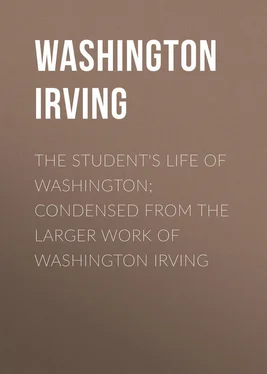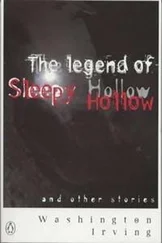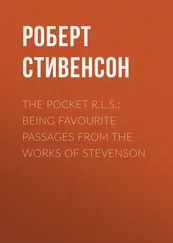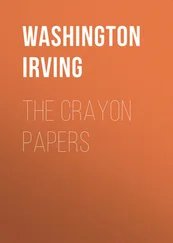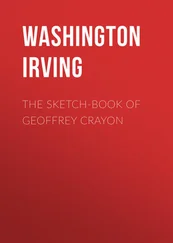Washington Irving - The Student's Life of Washington; Condensed from the Larger Work of Washington Irving
Здесь есть возможность читать онлайн «Washington Irving - The Student's Life of Washington; Condensed from the Larger Work of Washington Irving» — ознакомительный отрывок электронной книги совершенно бесплатно, а после прочтения отрывка купить полную версию. В некоторых случаях можно слушать аудио, скачать через торрент в формате fb2 и присутствует краткое содержание. Издательство: Иностранный паблик, Жанр: literature_19, foreign_antique, foreign_prose, на английском языке. Описание произведения, (предисловие) а так же отзывы посетителей доступны на портале библиотеки ЛибКат.
- Название:The Student's Life of Washington; Condensed from the Larger Work of Washington Irving
- Автор:
- Издательство:Иностранный паблик
- Жанр:
- Год:неизвестен
- ISBN:нет данных
- Рейтинг книги:3 / 5. Голосов: 1
-
Избранное:Добавить в избранное
- Отзывы:
-
Ваша оценка:
- 60
- 1
- 2
- 3
- 4
- 5
The Student's Life of Washington; Condensed from the Larger Work of Washington Irving: краткое содержание, описание и аннотация
Предлагаем к чтению аннотацию, описание, краткое содержание или предисловие (зависит от того, что написал сам автор книги «The Student's Life of Washington; Condensed from the Larger Work of Washington Irving»). Если вы не нашли необходимую информацию о книге — напишите в комментариях, мы постараемся отыскать её.
The Student's Life of Washington; Condensed from the Larger Work of Washington Irving — читать онлайн ознакомительный отрывок
Ниже представлен текст книги, разбитый по страницам. Система сохранения места последней прочитанной страницы, позволяет с удобством читать онлайн бесплатно книгу «The Student's Life of Washington; Condensed from the Larger Work of Washington Irving», без необходимости каждый раз заново искать на чём Вы остановились. Поставьте закладку, и сможете в любой момент перейти на страницу, на которой закончили чтение.
Интервал:
Закладка:
Tryon, the governor of New York, was at present absent in England, having been called home by the ministry to give an account of the affairs of the province, and to receive instructions for its management. He was a tory in heart, and had been a zealous opponent of all colonial movements, and his talents and address gave him great influence over an important part of the community. Should he return with hostile instructions, and should he and the Johnsons co-operate, the one controlling the bay and harbor of New York and the waters of the Hudson by means of ships and land forces; the others overrunning the valley of the Mohawk and the regions beyond Albany with savage hordes, this great central province might be wrested from the confederacy, and all intercourse broken off between the eastern and southern colonies. All these circumstances and considerations, many of which came under discussion in the course of this military journey, rendered the command of New York a post of especial trust and importance, and determined Washington to confide it to General Schuyler. He was peculiarly fitted for it by his military talents, his intimate knowledge of the province and its concerns, especially what related to the upper parts of it, and his experience in Indian affairs.
At Newark, in the Jerseys, Washington was met on the 25th by a committee of the provincial Congress, sent to conduct him to the city. The Congress was in a perplexity. It had in a manner usurped and exercised the powers of Governor Tryon during his absence, while at the same time it professed allegiance to the crown which had appointed him. He was now in the harbor, just arrived from England, and hourly expected to land. Washington, too, was approaching. How were these double claims to ceremonious respect happening at the same time to be managed?
In this dilemma a regiment of militia was turned out, and the colonel instructed to pay military honors to whichever of the distinguished functionaries should first arrive. Washington was earlier than the governor by several hours, and received those honors. The landing of Governor Tryon took place about eight o'clock in the evening. The military honors were repeated; he was received with great respect by the mayor and common council, and transports of loyalty by those devoted to the crown. It was unknown what instructions he had received from the ministry, but it was rumored that a large force would soon arrive from England, subject to his directions. At this very moment a ship of war, the Asia, lay anchored opposite the city; its grim batteries bearing upon it, greatly to the disquiet of the faint-hearted among its inhabitants. In this situation of affairs Washington was happy to leave such an efficient person as General Schuyler in command of the place.
In the meantime the provincial Congress of Massachusetts, then in session at Watertown, had made arrangements for the expected arrival of Washington. It sent on a deputation which met Washington at Springfield, on the frontiers of the province, and provided escorts and accommodations for him along the road. Thus honorably attended from town to town, and escorted by volunteer companies and cavalcades of gentlemen, he arrived at Watertown on the 2d of July, where he was greeted by Congress with a congratulatory address, in which, however, was frankly stated the undisciplined state of the army he was summoned to command. An address of cordial welcome was likewise made to General Lee.
The ceremony over, Washington was again in the saddle, and escorted by a troop of light horse and a cavalcade of citizens, proceeded to the head-quarters provided for him at Cambridge, three miles distant. As he entered the confines of the camp, the shouts of the multitude and the thundering of artillery gave note to the enemy beleaguered in Boston of his arrival.
His military reputation had preceded him and excited great expectations. They were not disappointed. His personal appearance, notwithstanding the dust of travel, was calculated to captivate the public eye. As he rode through the camp, amidst a throng of officers, he was the admiration of the soldiery and of a curious throng collected from the surrounding country. Happy was the countryman who could get a full view of him to carry home an account of it to his neighbors.
With Washington, modest at all times, there was no false excitement on the present occasion; nothing to call forth emotions of self-glorification. The honors and congratulations with which he was received, the acclamations of the public, the cheerings of the army, only told him how much was expected from him; and when he looked round upon the raw and rustic levies he was to command, "a mixed multitude of people, under very little discipline, order, or government," scattered in rough encampments about hill and dale, beleaguering a city garrisoned by veteran troops, with ships of war anchored about its harbor, and strong outposts guarding it, he felt the awful responsibility of his situation, and the complicated and stupendous task before him. He spoke of it, however, not despondingly nor boastfully and with defiance; but with that solemn and sedate resolution, and that hopeful reliance on Supreme Goodness, which belonged to his magnanimous nature.
CHAPTER XX.
SIEGE OF BOSTON
On the 3d of July, the morning after his arrival at Cambridge, Washington took formal command of the army. Accompanied by General Lee, on whose military judgment he had great reliance, he visited the different American posts, and rode to the heights commanding views over Boston and its environs, being anxious to make himself acquainted with the strength and relative position of both armies.
In visiting the different posts, Washington halted for a time at Prospect Hill, which, as its name denotes, commanded a wide view over Boston and the surrounding country. Here Putnam had taken his position after the battle of Bunker's Hill, fortifying himself with works which he deemed impregnable; and here the veteran was enabled to point out to the commander-in-chief, and to Lee, the main features of the belligerent region, which lay spread out like a map before them. Bunker's Hill was but a mile distant to the west; the British standard floating as if in triumph on its summit. The main force under General Howe was intrenching itself strongly about half a mile beyond the place of the recent battle. Howe's sentries extended a hundred and fifty yards beyond the neck or isthmus, over which the Americans retreated after the battle. A large force was intrenched south of the town on the neck leading to Roxbury – the only entrance to Boston by land. The troops were irregularly distributed in a kind of semicircle, eight or nine miles in extent; the left resting on Winter Hill, the most northern post, the right extending on the south to Roxbury and Dorchester Neck.
Washington reconnoitred the British posts from various points of view. Everything about them was in admirable order. The works appeared to be constructed with military science, the troops to be in a high state of discipline. The American camp, on the contrary, disappointed him. He had expected to find eighteen or twenty thousand men under arms; there were not much more than fourteen thousand. He had expected to find some degree of system and discipline; whereas all were raw militia. He had expected to find works scientifically constructed, and proofs of knowledge and skill in engineering; whereas, what he saw of the latter was very imperfect, and confined to the mere manual exercise of cannon.
In riding throughout the camp, Washington observed that nine thousand of the troops belonged to Massachusetts; the rest were from other provinces. They were encamped in separate bodies, each with its own regulations, and officers of its own appointment. Some had tents, others were in barracks, and others sheltered themselves as best they might. Many were sadly in want of clothing, and all, said Washington, were strongly imbued with the spirit of insubordination, which they mistook for independence.
Читать дальшеИнтервал:
Закладка:
Похожие книги на «The Student's Life of Washington; Condensed from the Larger Work of Washington Irving»
Представляем Вашему вниманию похожие книги на «The Student's Life of Washington; Condensed from the Larger Work of Washington Irving» списком для выбора. Мы отобрали схожую по названию и смыслу литературу в надежде предоставить читателям больше вариантов отыскать новые, интересные, ещё непрочитанные произведения.
Обсуждение, отзывы о книге «The Student's Life of Washington; Condensed from the Larger Work of Washington Irving» и просто собственные мнения читателей. Оставьте ваши комментарии, напишите, что Вы думаете о произведении, его смысле или главных героях. Укажите что конкретно понравилось, а что нет, и почему Вы так считаете.
